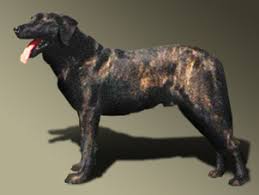
Castro Laboreiro Dog
Conditions of detention
The Castro Laboreiro Dog is best suited for rural or suburban environments where it has plenty of space to roam and explore.
Useful Fact: These dogs are highly adaptable but thrive in areas where they can exercise freely, making them ideal for farms or homes with large yards.
Nutrition and diet
A well-balanced diet rich in protein and essential nutrients is important for the Castro Laboreiro Dog to maintain its health and energy levels.
Useful Fact: Regular monitoring of their diet and weight is essential to prevent obesity and related health issues.
Health
Generally robust and healthy, the Castro Laboreiro Dog can still be prone to certain genetic conditions such as hip dysplasia and eye problems.
Useful Fact: Regular veterinary check-ups and early screenings can help detect and manage potential health issues effectively.
Grooming and care
The Castro Laboreiro Dog has a dense, weather-resistant coat that requires regular grooming. The coat is typically short to medium in length and can come in various shades of brindle and dark colors.
Useful Fact: Brushing the coat at least once a week helps manage shedding and keeps the coat healthy. More frequent grooming may be necessary during seasonal shedding periods.
Education and training
Castro Laboreiro Dogs are intelligent and have strong protective instincts. Early socialization and consistent, positive reinforcement training are crucial.
Useful Fact: Due to their independent nature, training should start early and be firm yet gentle to establish good behavior and obedience.
Toys and entertainment
These dogs enjoy activities that stimulate their mind and body, such as interactive toys, fetch games, and agility exercises.
Useful Fact: Providing toys that challenge their intellect can help prevent boredom and destructive behavior.
Safety
Being protective by nature, Castro Laboreiro Dogs should be socialized with people and other animals to reduce aggressive tendencies.
Useful Fact: Secure fencing in the yard is crucial to prevent them from wandering off or chasing after perceived threats.
Accessories
Durable collars, leashes, and harnesses are essential, along with sturdy food and water bowls and a comfortable bed.
Useful Fact: A well-fitted harness can provide better control during walks and is often more comfortable for these large dogs than a collar.
Socialization
Early and consistent socialization with a variety of people, animals, and environments helps ensure a well-rounded and balanced temperament.
Useful Fact: Puppy classes and regular playdates with other dogs can significantly improve their social skills and confidence.
Travel and Transportation
Castro Laboreiro Dogs can travel well if accustomed to it from a young age. Ensure they are comfortable and secure during travel.
Useful Fact: Using a spacious crate or dog seat belt can enhance safety and comfort during car rides.
Behavior and psychology
These dogs are loyal, protective, and have a calm demeanor when well-trained and socialized. They thrive on having a job to do.
Useful Fact: Understanding their guardian instincts can help in providing appropriate outlets for their energy and drive, such as herding or watchdog duties.
Legal aspects
Check local regulations regarding ownership of large breeds and any specific requirements for registration, vaccination, and containment.
Useful Fact: Some regions may have breed-specific legislation, so it’s important to be aware of and comply with local laws to avoid legal issues.


